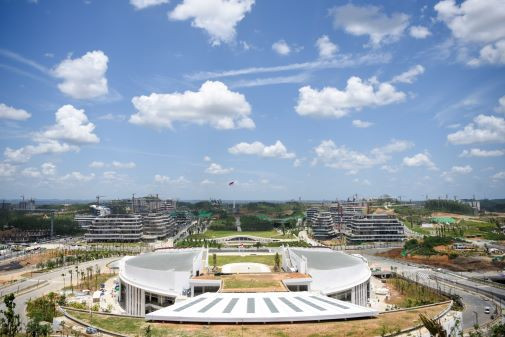Popular Reads
Top Results
Can't find what you're looking for?
View all search resultsPopular Reads
Top Results
Can't find what you're looking for?
View all search resultsThe thing about megaprojects
An energetic continuation of the Nusantara project following the government handover would assure investors that the country’s national strategic projects are called “national” for a reason.
Change text size
Gift Premium Articles
to Anyone
T
he fact that President Prabowo Subianto made no mention of Nusantara in his inauguration speech on Oct. 20 has caused some concern about his commitment to the planned new capital city.
After all, the address marking the very start of his presidency would have been the ideal occasion to reassure any skeptics of the megaproject’s continuity, and there seems to be no good reason not to spare a minute for the topic in an hour-long oration.
To quell speculation about his commitment, the President reportedly did finally speak on Nusantara on Sunday, one week after his inauguration.
Forestry Minister Raja Juli Antoni said Prabowo, in a briefing to members of his Red-and-White Cabinet during a three-day retreat in Magelang, Central Java, had made it clear that he had decided to follow through with the project and wanted key facilities finished within four years.
It is only a verbal pledge at this point, but that is more than we had a week ago.
Any impression, whether accurate or not, that former president Joko “Jokowi” Widodo’s pet project has moved to the back burner under Prabowo would have material implications for construction on the ground.
The effects would go far beyond that, in fact, because if the project’s priority could shift from one day to the next, how could investors have confidence in any other of the nation’s long-term projects, including Prabowo’s own pet projects for food security and biofuel.
The thing about megaprojects is that they typically outlast a single president’s tenure.
An energetic continuation of the Nusantara project after the government handover would assure investors that the country’s national strategic projects are called “national” for a reason.
The term implies that these are projects of the nation rather than of the president of the day and that they have been deemed to be of strategic relevance and hence not subject to political whims.
Is discontinuation a risk we must live with in a democracy? Are the five-year plans announced at the start of a new presidential term the best we can do to chart the course of the nation?
That would be a problem when it comes to creating a favorable investment climate around long-term development.
Indonesia has a reputation for ad hoc policymaking that can change industry rules overnight, but the impression that key pillars of national development start shaking every time the government changes would be particularly detrimental.
Jokowi did his best to future-proof the Nusantara project by ensuring broad approval across the party spectrum in the House of Representatives vote on the matter more than a year ago, well before the presidential election.
Except for the Prosperous Justice Party (PKS), all parties voted in favor of the Nusantara Capital City (IKN) Law, including the opposition Democratic Party.
The ex-president also presented some key deliverables on Nusantara before leaving office, even if some of those efforts looked rather forced, by celebrating Indonesia’s Independence Day in the city in August, holding a first cabinet meeting there and presiding over groundbreaking ceremonies for hotels, a mall, transportation hubs, utility infrastructure and more.
Words are all we can expect from Prabowo on Nusantara at this early point in his presidency, but action will need to follow soon to ensure investor confidence.
The real test of his commitment to the project will be the allocations for it his administration makes in future budgets.
Private investors are expected to fund the lion’s share of the city’s development, but we know by now that many of them are waiting for the government to do some heavy lifting before getting involved themselves.
A more detailed legal basis for Nusantara could have helped reassure investors about each step of Nusantara’s development and the viability of private projects within it.
It is not too late to fix that, and a determined push for Nusantara could get Prabowo closer to his goal of 8 percent GDP growth.











